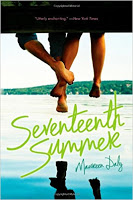
- OR the magical distinction between YA and adult literature
- OR why Mia Thermopolis is not the same as Lee Fiora
amongst publishing professionals. We point to Maureen Daly’s 1942 novel
SEVENTEENTH SUMMER, the National Library Association’s coining of the phrase “young
adult” in the 1960s, and the 1970s heyday of Judy Blume and Robert Cormier . We
marvel at Harry Potter and Twilight, and we look uncertainly into the mid-twenty-first
century, as “chick lit” and “new adult” came and went faster than the kale fad.
Now, we ask ourselves, what’s next for YA – and what is (was) it anyway?
 What, for example, makes Curtis Sittenfeld’s PREP or SPECIAL
What, for example, makes Curtis Sittenfeld’s PREP or SPECIALTOPICS IN CALAMITY PHYSICS by Marisha Pessle adult books, while prep school
turns by E. Lockhart (THE DISREPUTABLE HISTORY OF FRANKIE LANDAU-BANKS) or
Daisy Whitney (THE MOCKINGBIRDS) are intuitively placed on the young adult
shelf?
novel with a high school-aged protagonist a work of young adult literature? The theme of most replies to this question is
that YOUNG ADULT novels feature not only teen protagonists but cathartic – dare
I say hopeful – endings. That, in the end, the protagonist emerges not merely more
or less triumphant over mortality or evil or agnostic despair but, also with a
sense that things will take a turn for the better. So, in simple sum: optimism
equals young adult. Can that be? I think there’s more.

In terms of narrative structure, Martel’s and Sittenfeld’s protagonists
tell their tales looking back ruefully, with sober comprehension that they are
not, in fact any better now than they were when their stories unfolded and that
the world is a place that demands less-than. In adult fiction, if you’re a
princess you’re Diana, not Meghan Markle.
Sometimes it takes more courage not to let yourself see.
Sometimes knowledge is damaging – not enlightenment but enleadenment. – Blue van
Meer, SPECIAL TOPICS IN CALAMITY PHYSICS by Marisha Pessl
In the end, there was always your regular life,
and no one could deal with it but you. ― Lee Fiora, PREP by Curtis Sittendfeld
Meanwhile, Cabot’s and Whitney’s teen protagonists reach
their stories’ ends “un-enleadened.”
Yes, I am a freak. But you know what? Someday, I just might
grow out of that. But you, you will never stop being a jerk. — Mia Thermopolis, THE PRINCESS DIARIES MOVIE
based on the novel by Meg Cabot
 It is not mere optimism that Mia reveals, but a greater sense
It is not mere optimism that Mia reveals, but a greater senseof evolutionary identity – the possibility of transcendence, of transformation.
Despite their youth, the teen protagonists of adult novels emerge from their
travails “sadder but wiser” as the cliché goes. Meanwhile, Daisy Whitney’s Alex
– not unlike J. K. Rowling’s wizard hero Harry Potter – takes on a leadership
role in the group that initially saved her life and becomes, on a
bigger-than-self scale, a fighter against evil. And Cabot’s Mia Thermopolis finds
out both that she really is royalty and
that she can be noble on her own terms.
defines a novel’s genre so much as the sense that who we are is not all that we
can or will be. That, perhaps, the world can be saved. And that hope is not lost
EXPRESSLY BECAUSE of our own innate potential. Or, to quote a red-head:
Anything is possible
if you’ve got enough nerve. – Ginny Weasley, HARRY POTTER series by J.K. Rowling



